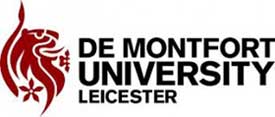Childhood and Youth Studies courses
De Montfort University

- UK
- World Rank : 601
- Visit Website
Youth work has been described as ‘the science of enabling young people to believe in themselves and build positive futures’ (National Youth Agency).
Working with people primarily aged between 11 and 25 is both a challenging and rewarding career choice and the professionals specialising in this field aim to support a young person to develop both personally and socially.
On this course, you’ll cover the history and development of youth and community work, explore the self, groups and learning, society and social policy, and develop your understanding of social science.
You’ll also be looking at oppression, globalisation, how agencies work together, and community development and management, as well as enhancing your research, practical and managerial skills.
Compulsory work placements in youth and community centres, and schools and voluntary organisations, provide ample opportunity to achieve hands-on experience working alongside professional youth and community workers. And you’ll see, first-hand, some of the issues that can affect young people and their communities.
Key features
Entry criteria
Plus five GCSEs at grade C/4 or above including English.
Alternative qualifications include:zz
We will normally require students to have had a break from full-time education before undertaking the Access course.
We may still consider applicants that do not meet the GCSE requirements providing they can demonstrate ability or attainment in these subjects in an alternative way; usually through work experience, alternative qualifications or by a University admissions test or interview. All such applicants will be considered on a case by case basis.
Interview: Yes. Professional conduct during the event will also contribute to the decision making regarding an applicant’s application. Interviews are currently being conducted remotely via Microsoft Teams.
English language requirements:
If English is not your first language an IELTS score of 6.5 or equivalent when you start the course is essential. English language tuition, delivered by our British Council accredited Centre for English Language Learning (CELL), is available both before and during the course.
| Type of Institution | Public |
| Campus Setting | Urban |
| Endowment | £1.17 million |
| Number of Campuses | 4 faculties |
| Number/Percentage of International Students | 23205 |
| Total number of Professors | 3240 |
| Student Satisfaction Rate | 86% |
| Graduate Job Rate | 97.3% |
| Number of Residence Vacancy | Around 3000 |
| International fee | Undergraduates- £13240 (annual) Postgraduates- £15950 (annual) |
| Number of Academic Programs | UG, PG, Part time, distance, blended |
| Mode of Program | Full time, distance and online |
| Average Graduate Salary | 19800 pounds a year |
| Field of Study | Avg.Fees |
|---|---|
| Art, Design and Humanities: | £13,750 |
| Business and Law | £13,750-£14,550 |
| Media | £13,750 - £14,250 |
| Engineering | £14,250 |
| Computing | £14,250 |
| Health and Life Sciences | £13,250 - £14,250 |
| Nursing BSc | £14,950 |
| Expenses | Estimated cost in pounds |
|---|---|
| Undergraduate tuition fee | 13,250- 14950 |
| Postgraduate tuition fee | 13600-15,900 |
| On campus accommodation | 5,000-6040 |
| Average cost of living | 97-110 per week |
DMU International Scholarship up to 1500 pounds
| Tuition Fees in UK (1st Year Average) | MS: £17276 | MBA: £17276 | BE/Btech: £16632 | BBA: £15130 | BSc: £16632 | MFin: £19000 | MA: £15560 | MIM: £18241 | MEM: £16950 | MArch: £14271 | BHM: £12662 | MIS: £15344 | MEng: £12876 | MBBS: £28865| MPharm: £15452 |
| Average Accomodation & Food Costs in UK | £850 to £1,050 a month |
| Entrance Exams in UK | TOEFL: 88 | IELTS: 6.5 | PTE: 59 | GMAT: 590 |
| Work and Study in UK | Permitted for 20 hours/week with a valid study permit. |
| Post Study Work Permit in UK | 2 Year after graduation depending on the course. |
| Cost of Student Visa in UK | £348 |
| Student Visa in UK | Your nationality, duration of your stay and purpose of your stay are the three essential factors for UK visa. For Non-EU students UK visa is mandatory. |
| Intakes in UK | There are mainly two intakes in UK: January/February & September/October. |
| Top Job Sectors in UK | IT Engineering, Product Design, Mobile Development, Designers, Logistics, etc. |
| Economy in UK | Growth Rate: 1.3% (2018) 1.4% (2019) 1.4% (2020e), 6th Largest Economy in the World by Nominal |
Tuition & fees :
£ 14,750
Hostel & Meals :
£ 6,063
Total
£ 20,813